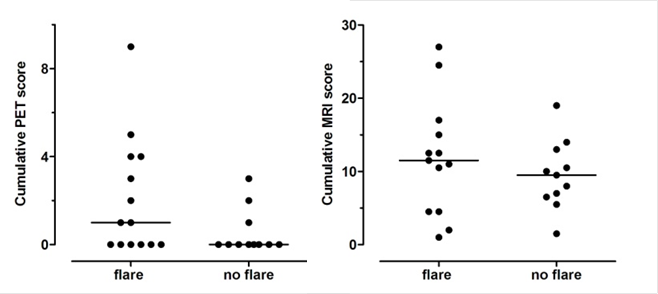Session Information
Session Type: Abstract Submissions (ACR)
Background/Purpose: Recurrent flares in RA patients in complete remission (CR) are not an uncommon phenomenon. Studies with advanced imaging techniques have suggested that residual subclinical synovitis can still be present despite clinical remission and has been linked to ongoing radiological damage. Our group has shown that positron emission tomography with macrophage targeting (11C-(R)-PK11195 PET) is a highly sensitive and specific technique to visualize (subclinical) arthritis activity. In the current study we investigated if 11C-(R)-PK11195 PET can depict residual disease activity in early RA patients who reached CR and whether the inflammatory activity on the scans was associated with the development of a flare (as compared to MRI).
Methods: 11C-(R)-PK11195 PET (HRRT, CTI/Siemens) of hands/wrists was performed in 25 RA patients that had no tender or swollen joints after treatment with combined DMARD therapy (DAS44<1.6). (R)–11C-PK11195 uptake (visual score: 0 (low)-3 (high)) in metacarpophalangeal, proximal interphalangeal and wrist joints (n=22 joints/patient) was scored and corrected for background uptake. Individual joint scores were summed to obtain a cumulative PET score (range 0-66). Follow-up duration was 1 year after PET. Flare of clinical disease activity was defined as ³ 1 swollen joint. Results: Of the included patients, 14 out of 25 (56%) developed a clinical flare of arthritis anywhere within 1 year of follow-up. (R)–11C-PK11195 PET showed enhanced tracer uptake in at least one scanned joint in 11/25 (44%) patients. Cumulative PET scores of patients developing a flare tended to be higher than that of patients without a flare (median (IQR) 1 (0-4) vs 0 (0-1), p=ns) (Fig left). Within the flare subgroup, patients with a flare in hands/wrists (n=6), had significantly higher cumulative PET scores than patients without a flare (n=11)(p=0.04). Patients with a cumulative PET score of 4 and higher, all developed arthritis in hands/wrists within 6 months. As comparison, MRI scans of all included patients were positive regardless of flaring, not distinguishing between subgroups of flare and no flare (Fig right).
Conclusion: Macrophage targeting by (R)–11C-PK11195 PET can visualize subclinical synovitis in hand/wrist joints of drug-induced remission in early RA. Uptake of (R)–11C-PK11195 was higher in patients with with a flare compared to those without a flare. High cumulative PET scores seem to be associated with short-term development of flare. In comparison to MRI, PET may have superior diagnostic value with respect to specificity. Larger cohort studies are needed to confirm these data.
Disclosure:
Y. Y. J. Gent,
None;
M. M. ter Wee,
None;
D. den Uyl,
None;
N. Ahmadi,
None;
W. F. Lems,
None;
O. S. Hoekstra,
None;
A. E. Voskuyl,
None;
C. J. Van der Laken,
None.
« Back to 2014 ACR/ARHP Annual Meeting
ACR Meeting Abstracts - https://acrabstracts.org/abstract/subclinical-arthritis-is-detected-by-macrophage-targeting-and-positron-emission-tomography-pet-in-early-ra-patients-in-clinical-remission/

